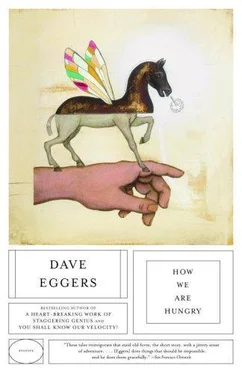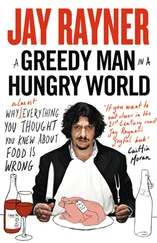Dave Eggers - How We Are Hungry
Здесь есть возможность читать онлайн «Dave Eggers - How We Are Hungry» весь текст электронной книги совершенно бесплатно (целиком полную версию без сокращений). В некоторых случаях можно слушать аудио, скачать через торрент в формате fb2 и присутствует краткое содержание. Год выпуска: 2005, Издательство: Vintage Canada, Жанр: Современная проза, на английском языке. Описание произведения, (предисловие) а так же отзывы посетителей доступны на портале библиотеки ЛибКат.
- Название:How We Are Hungry
- Автор:
- Издательство:Vintage Canada
- Жанр:
- Год:2005
- ISBN:нет данных
- Рейтинг книги:3 / 5. Голосов: 1
-
Избранное:Добавить в избранное
- Отзывы:
-
Ваша оценка:
- 60
- 1
- 2
- 3
- 4
- 5
How We Are Hungry: краткое содержание, описание и аннотация
Предлагаем к чтению аннотацию, описание, краткое содержание или предисловие (зависит от того, что написал сам автор книги «How We Are Hungry»). Если вы не нашли необходимую информацию о книге — напишите в комментариях, мы постараемся отыскать её.
A Heartbreaking Work of Staggering Genius
How We Are Hungry — читать онлайн бесплатно полную книгу (весь текст) целиком
Ниже представлен текст книги, разбитый по страницам. Система сохранения места последней прочитанной страницы, позволяет с удобством читать онлайн бесплатно книгу «How We Are Hungry», без необходимости каждый раз заново искать на чём Вы остановились. Поставьте закладку, и сможете в любой момент перейти на страницу, на которой закончили чтение.
Интервал:
Закладка:
“Poly poly,” says a descending porter. He is wearing tasseled loafers.
“Poly poly,” Grant says.
“I got here a few days before the rest of you,” Grant says, by way of explanation and apology, once the porter has passed. He feels that he’s shamed Rita and has allowed her to suffer long enough. “I spent some time in Moshi, picked up some things.”
“‘Jambo’ is ‘hello,’” he says. “‘Poly poly’ means ‘step by step.’”
A porter comes up behind them.
“Jambo,” he says.
“Jambo,” Grant says, with the same inflection, the same stretching of the second syllable, as if delivering a sacred incantation. Jaaaahmmmboooow . The porter smiles and continues up. He is carrying a propane tank above his head, and a large backpack sits between his shoulders, from which dangle two bags of potatoes. His load is easily eighty pounds.
He passes and Grant begins behind him. Rita asks Grant about his backpack, which is enormous, twice the size of hers, and contains poles and a pan and a bedroll. Rita had been told to pack only some food and a change of clothes, and to let the porters take the rest.
“I guess it is a little bigger,” he says. His tone is almost too kind, too accommodating. It verges on the pedantic and Rita wonders if she’ll hate the man in a matter of hours.
“Is that your tent in there, too?” she asks, talking to his back.
“It is,” he says, stopping. He shakes out from under his pack and zippers open a compartment on the top.
“You’re not having a porter carry it? How heavy is that thing?”
“Well, I guess… it’s just a matter of choice, really. I’m… well, I guess I wanted to see if I could carry my own gear up. It’s just a personal choice.” He’s sorry for carrying his things, sorry for knowing “hello.” He spits a stream of brown liquid onto the ground.
“You dip?”
“I do. It’s disgusting, isn’t it?”
“You’re not putting that sucker in there, too.”
Grant is unwrapping a Charms lollipop.
“I’m afraid so. It’s something I do. Want one?”
Rita wants something like the Charms lollipop, but now she can’t separate the clean lollipops in his Ziploc bag — there are at least ten in there — from the one in his mouth, presumably covered in tobacco juice.
Minutes later, the trail turns and under a tree there is what looks like a hospital gurney crossed with a handcart. It’s sturdy and wide, but with just two large wheels, set in the middle, on either side of a taut canvas cot. There are handles on the end, so it can be pulled like a rickshaw. Grant and Rita make shallow jokes about the contraption, about who might be coming down on that, but being near it any longer, because it’s rusty and terrifying and looks like it’s been used before and often, makes them think, and they don’t want to think so they walk on.
When they arrive at a clearing, they’ve been hiking, quickly, for six hours. They are at what they assume to be their camp, and they are alone. The trees have cleared — they’re now above treeline — and they’re standing on a hillside, covered in fog, with high grass, thin like hair, everywhere. The rain has not subsided and the temperature has dropped. They have not seen any of the other hikers or guides for hours, nor have they seen any porters. Rita and Grant have been hiking quickly and beat everyone up the trail, and were not passed by anyone, and she feels so strong and proud about this. She can tell that in some way Grant is also proud, but she knows he wouldn’t say so.
Within minutes she is shaking. It’s no more than forty degrees and the rain is harder here; there are no trees diverting its impact. And there are no tents assembled, because they have beaten the porters to the camp. Even Grant seems to see the poor reasoning involved in their strategy. The one thing Grant doesn’t have is a tarp, and without it there is no point in pitching his tent on earth this wet. They will have to wait, alone in the rain, until the porters arrive.
“It’ll be at least an hour,” Grant says.
“Maybe sooner for the porters?” Rita suggests.
“We sure didn’t think this one through,” he says, then spits a brown stream onto a clean green banana leaf.
Under a shrub no more than four feet tall, offering little protection, they sit together on a horizontal and wet log and let the rain come down on them. Rita tries not to shiver, because shivering is the first step, she remembers, to hypothermia. She slows her breathing, stills her body, and brings her arms from her sleeves and onto her naked skin.
Frank is furious. His eyes are wild. He feels compromised. The paying hikers are all in a cold canvas tent, sitting around a table no bigger than one meant for poker, and they are eating dinner — rice, plain noodles, potatoes, tea, orange slices.
“I know a few of you think you’re hotshots,” Frank says, blowing into his tea to cool it, “but this is no cakewalk up here. Today you’re a speed demon, tomorrow you’re sore and sick, full of blisters and malaria and God knows what.”
Grant is looking straight at him, very serious, neither mocking nor confronting. He is staring at Frank as if Frank were explaining something on the menu.
“Or you get an aneurysm. There’s a reason you have a guide, people. I’ve been up and down this mountain twelve times, and there’s a reason for that.” He blows into his tea again. “There’s a reason for that.”
He shakes his head as if suddenly chilled. “I need to know you’re gonna act like adults, not like… yahoos!” And with that he burrows his thumb and forefinger into his eye sockets, a man with too much on his mind.
The food before the group has ostensibly been cooked, by the porters, but within the time it took to carry it from the tent where it was heated to this, their makeshift dining tent, the food has gone cold. Everyone eats what they can, though without cheer. The day was long and each hiker has an injury or an issue. Mike’s stomach is already feeling wrong, and at some point Shelly slipped and cut her hand open on a jagged tree stump. Jerry is having the first twinges of an altitude headache. Only Rita and Grant are, for the time being, problem-free. Rita makes the mistake of announcing this, and it seems only to get Frank angrier.
“Well, it’ll happen sooner or later, ma’am. Something will. You’re probably better off being sick now, because in a few days, it’ll hit you harder and deeper. So pray to get sick tonight, you two.”
“You sit over there, you’ll get dead,” Jerry says, pointing to a corner of the tent where a hole is allowing a drizzle to pour onto the floor. “What kinda equipment you providing here anyway, Frank?” Jerry’s tone is gregarious, but the message is plain.
“Are you dry?” Frank asks. Jerry nods. “Then you’re fine.”
They’re sitting on small canvas folding stools, and the paying hikers have to hunch over to eat; there is no room for elbows. When they first sat down they had passed around and used the clear hand-sanitizing fluid provided — like Softsoap but cool and stinging lightly. Rita had rubbed her hands and tried to clear the dirt from her palms, but afterward found her hands no cleaner. She looks at her palms now, after two applications of the sanitizer, and though they’re dry their every line and crevice is brown.
The man who brought the platters of rice and potatoes— named Steven — pokes his head into the tent again, his smile preceding him. He’s in a purple fleece pullover with a matching stocking cap. He announces the coming of soup and everyone cheers. Soon there is soup finally and everyone devours it. The heat of the bodies of the paying hikers slowly warms the canvas tent and the candles on the table create the appearance of comfort. But they know that outside this tent the air is approaching freezing, and in the arc of night will dip below.
Читать дальшеИнтервал:
Закладка:
Похожие книги на «How We Are Hungry»
Представляем Вашему вниманию похожие книги на «How We Are Hungry» списком для выбора. Мы отобрали схожую по названию и смыслу литературу в надежде предоставить читателям больше вариантов отыскать новые, интересные, ещё непрочитанные произведения.
Обсуждение, отзывы о книге «How We Are Hungry» и просто собственные мнения читателей. Оставьте ваши комментарии, напишите, что Вы думаете о произведении, его смысле или главных героях. Укажите что конкретно понравилось, а что нет, и почему Вы так считаете.












